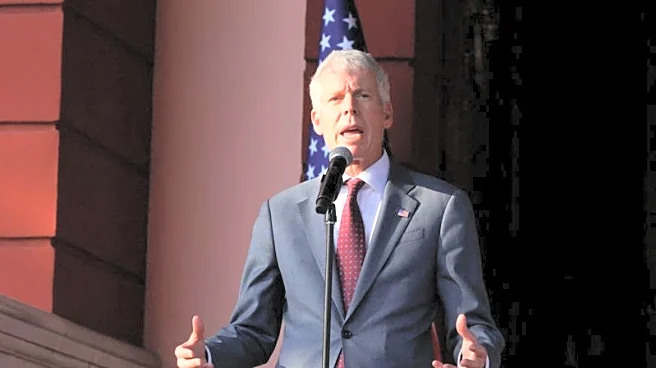What's Happening?
Recent data indicates a slowdown in the U.S. labor market, with first-time claims for unemployment benefits reaching an 11-week high and private-sector hiring significantly reduced. The August jobs report, expected to be released soon, is forecasted to show modest job gains of 80,000, slightly up from July's 73,000. This slowdown follows downward revisions in job growth for May and June, which were reduced by a combined quarter of a million jobs. President Trump has dismissed Bureau of Labor Statistics Commissioner Erika McEntarfer, alleging manipulation of job data for political purposes, and nominated E.J. Antoni from the Heritage Foundation as her replacement. The labor market's current state reflects a balance between labor supply and demand, influenced by factors such as an aging workforce, reduced immigration, and tariff policies under the Trump administration.
Why It's Important?
The slowing labor market has significant implications for the U.S. economy, affecting consumer spending and business investment. A reduced pace of job creation can lead to fewer opportunities for workers and job seekers, potentially stalling economic growth. The uncertainty in hiring plans, partly due to tariff policies, may lead businesses to tighten budgets, impacting overall economic activity. Additionally, the rise in Black unemployment rates could signal broader labor market challenges. Wage growth is also expected to decelerate, which, coupled with rising inflation, could further dampen consumer spending. These developments may influence the Federal Reserve's decisions on interest rates, with potential rate cuts being considered to stimulate economic activity.
What's Next?
The upcoming August jobs report will provide further insights into the labor market's health. Economists are closely monitoring payroll figures and unemployment rates, which could affect the Federal Reserve's monetary policy decisions. A hotter-than-expected payroll reading might delay anticipated rate cuts, while lower job growth could prompt immediate action. The Fed's decision will also depend on upcoming inflation data. Businesses and policymakers will need to address the structural issues affecting labor supply, such as immigration and workforce aging, to stabilize the job market.
Beyond the Headlines
The nomination of E.J. Antoni as BLS Commissioner raises concerns about potential political influence on economic data, which could affect public trust in reported figures. The labor market's reliance on specific industries for job growth, such as healthcare and leisure, highlights vulnerabilities in other sectors like manufacturing and retail. Addressing these disparities is crucial for long-term economic stability. The rise in Black unemployment rates may require targeted policy interventions to prevent further disparities and ensure equitable job opportunities.











